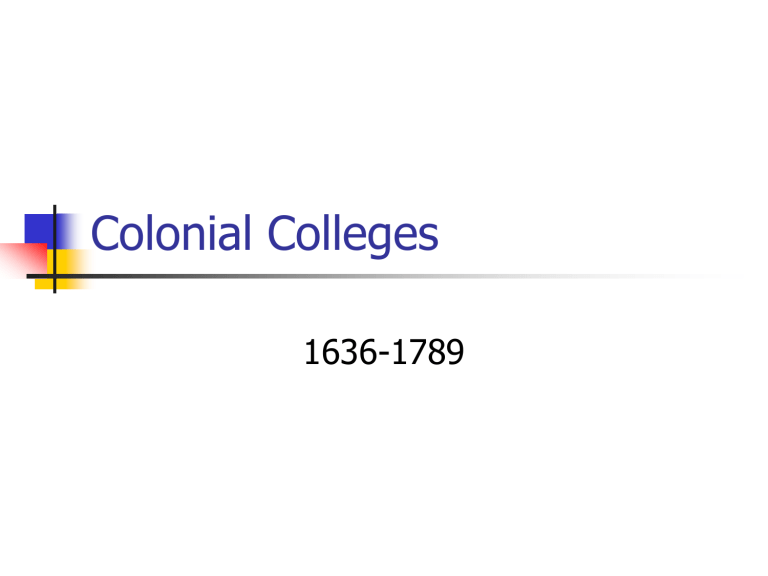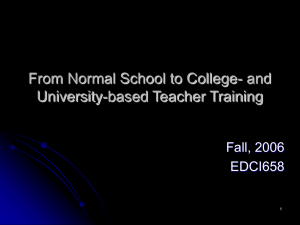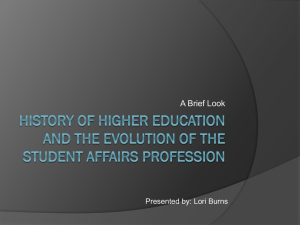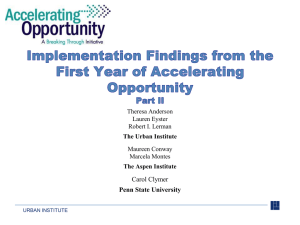Colonial Colleges

Colonial Colleges
1636-1789
Colonial Colleges
1.
Goals:
Teach the young
Culture
2.
3.
Teach the Classics
Problem: couldn’t understand Latin
Prepare for service (clergy & public servant)
In this period college was teaching you to use your mind
Colonial Colleges
Beginning of Revolutionary War – 9 colleges existed
Background on 9 colony colleges
By 1646: 200 graduates of Oxford/Cambridge settled in colonies
1636-
1693
Harvard
Puritan General Court of Massachusetts
“Every one shall consider the main end of his life and studies to know
God and Jesus Christ, which is eternal life.”
William and Mary
Anglican
“piously educated youth of good letters and manners and also propagate Christian faith among the Indians.”
1701-Yale Puritan
“Where in youth may be instructed in the arts and sciences, who through the blessings of Almighty God, may be fitted for public employment, both in the church and state.”
1740 – College of Philadelphia
Unique-no mention of the training of ministers as a purpose
Colonial Colleges
Background on 9 colony colleges cont.
1746 – College of New Jersey
Calvinists-New Lights
1754-King’s College (New York)
Conflict b/w Anglican/Presbyterian
1764 – College of Rhode Island
Increase Baptist ministers
1769 – Dartmouth
Educate ministers to serve Indians
1770-Queen’s College (New Jersey)
Dutch Reform
Early colony colleges did not administer religious admissions tests
9 colony colleges founded by cooperation b/w the state and church
Colonial Colleges
Interesting Tidbits on impact of religion on colonial colleges
The main gate at Harvard
“Congregational Church desired to breed, bring up, and create in the college successors for the educated ministers that had emigrated from
England.”
Rhode Island charter: “…sectarian differences of opinions shall not make any part of the public and classical instruction; although all religious controversies may be studied freely, and explained.”
King’s College may not “…exclude any person of any religious denomination whatever, from equal liberty and advantage of education.”
College of New Jersey provided that “…those of every religious denomination may have free and equal liberty and advantage of education in said college.”
Colonial Colleges
Colonial Life
17 th Century – 600 students enrolled at Harvard; 485 graduated
1710 – Yale 36 students, Harvard 123 students
1770- Yale 338 students, Harvard 413 students
1776 – 3000 living graduates of colonial colleges
1770- SC newspaper editorializing against founding college in SC
“…learning would become cheap and common, every man would be giving his son an education.”
Admission requirement for colonial college: oral and written exams in Latin w/president
Evidence of character
“Admittatur” – granted by the President
Colonial Colleges
Curriculum
Classical languages and literature – core: classical curriculum
Year 1: Latin, Greek, logic, Hebrew, rhetoric
Year 2: Latin, Greek, Hebrew, natural philosophy
Year 3: natural and moral philosophy (economics, ethics, political science, and sociology)
Year 4: Latin, Greek, logic, natural philosophy, math
Mid 18 th C- Addition of natural sciences, English literature, some modern languages
1738 – Harvard created a physics lab – students studied earthquakes
1749- Yale received a telescope, microscope, and a barometer
New sciences did not replace the classical curriculum
1754-Kings College announced a curriculum of “surveying, navigation, geography, commerce, govt. history…of every thing useful…”
1720 Harvard; geometry studied senior year; 1855 admission requirement
Colonial Colleges
Degrees
Harvard awarded 1 st bachelors degree in 1642
9 students received bachelors in 1642
Harvard assumed authority to grant a degree – step toward independence
Master’s program: 3 years w/o prescribed course of study
-
Colonial Colleges
Faculty and Administration
- Medieval times- colleges self governing under the authority of the king or pope
- Harvard created a Board of Overseers, consisting of judges and clergy
Harvard (1806) – faculty excluded from serving on the corporation, indication that faculty had lost control of Harvard
- President of Harvard-only member on Board w/a college background
- Yale: Single governing board – Congregational clergy held all seats
- Yale changed this model in the mid 18 th C
- Colonial college presidents – Administration, may have been the primary teacher, handled all discipline-normally flogging
Colonial Colleges
Student Life/Socioeconomic facts
1677-1703: occupations of 300 fathers of students consisted of:
79 ministers; 45 shopkeepers; 35 lawyers/judges; 28 wealthy landowners, military;31 artisans seamen servant; 11 ordinary farmers
These #s do not equal 300 but hey don’t shoot the messenger!
Typically only the sons of the rich attended college
Some members of the lower class did attend college
Financial aid existed: students could work and be paid by the more affluent student
Colonial Colleges
Student life cont.
Residential colleges
- Oxford and Cambridge had residential colleges
- Colonial colleges built dormitories to house students-they were not the living learning centers of the English colleges
Religion dominated student life
Student Clubs literary societies developed-opportunities for free expression beyond classroom recitation
Discipline/rebellion/beer
Friction b/w faculty and students, petty rules governing every aspect of life, flogging replaced by fines, loss of privileges, food – an issue, beer served in dining halls until early 1800s
Colonial Colleges
•
Reasons for not sending son to college:
- Curriculum not aimed at preparing practical people
Does a farmer really need to know Hebrew?
- Cost required available cash
- Distance was a problem
- Most families were farmers and could not lose sons
- Education was the responsibility of parents
College Admittance
- oral and written presentations
- Yale required evidence of good moral character; 1745- arithmetic
- Knowledge of Greek and Latin
- As secondary curriculum grew those students who lacked the skills taught at the secondary level studied with a tutor clergyman until prepared for college
Colonial Colleges
•
Curriculum
- Classics from Cambridge/Oxford
Instruction
Memorization
Latin phased out
Evidence of the war b/w practical training and colonial college education or
Starbucks conversation :
Native Americans response to invitation to send 6 boys to Williamsburg College in the 1770s “We thank you heartily. But you, who are wise, must know that different nations have different conceptions of things…, if our ideas of education happen not to be the same as yours. We have had some experience with it.
Several of our young people were formerly brought up at your college; they were instructed in all your sciences; but, whey they came back to us, they were bad runners, ignorant of every means of living in the woods, unable to bear either cold or hunger…take a deer or kill an enemy, spoke our language imperfectly, were therefore neither fit for hunters or warriors, they were totally good for nothing. Though we decline accepting your offer, if the gentlemen of
Virginia will send us a dozen of their sons we will make men of them…”
Colonial Colleges







